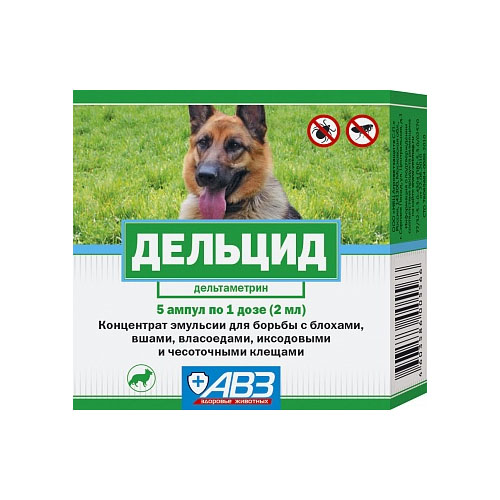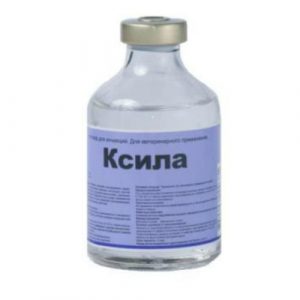Description
Pharmacological action
Deltamethrin, part of the drug belongs to the group of synthetic pyrethroids and has pronounced insectoacaricidal intestinal and contact action. Active against sarcoptoid, ticks, bed bugs, lice, fleas, flies, mosquitoes and other ectoparasites of animals.
The mechanism of action of deltamethrin is based on the blocking of neuromuscular transmission of nerve impulses at the level of ganglions of peripheral nerves, which leads to paralysis and death of parasites.
Delcidium according to its degree of exposure to the body refers to moderately hazardous substances (hazard class 3 according to GOST 12.1.007-76), at the recommended doses it does not have a local irritant, resorptive-toxic and sensitizing effect. Contact with mucous membranes causes slight irritation. Toxic to fish and bees.
Indications
For the treatment of animals with arachno-entomoses, as well as for the disinfestation and decontamination of rooms.
Contraindications
Do not use Delcid for treating weakened and depleted animals, as well as females later than 2 weeks before delivery.
Recommendations for use
An emulsion for processing is prepared immediately before use. In this case, the volume of the emulsion necessary for processing and the amount of Delcide required for its preparation are determined.
The required volume of Delcide is thoroughly mixed with 2-3 volumes of water, and then poured into a water bath or spray device tank, adding water to the required volume with stirring.
Animals of short-haired breeds are sprayed with an aqueous emulsion of Delcid, long-haired – bathe in an aqueous emulsion of the drug.
The drug is dissolved in cool tap water in the following concentrations:
Processing animals by spraying or bathing.
– Honest ticks, demodex: 1 dose per 1.6 liters of water for prophylactic purposes – once. With treatment – 2-3 times with an interval of 7-10 days. The affected areas are treated with a grip along the perimeter of the focus of 1-2 cm of healthy skin. The interval of 7 days until 2 negative findings of the study of scrapings.
– Ixodid ticks: 1 dose per 2.2 liters of water. In the period of high tick activity, the interval between treatments is 7-10 days.
– Lice, fleas, hairs, flies, horseflies, gnats: 1 dose per 6.4 liters of water for prophylactic purposes – once, with treatment – twice with an interval of 7-10 days.
Sequence of spraying the animal: auricles, head, body, tail, area around the anus, limbs. When processing, do not allow the emulsion to get into the eyes, nose and mouth of the animal. Moisten the animal s hair and allow it to dry. Do not flush the drug. It is not recommended to bathe the animal with shampoos 3 days before – and 3 days after treatment.
Use only freshly prepared emulsion!
At the end of the treatment, wash your hands thoroughly with warm water and soap. Delcid and its water emulsion are toxic to bees and fish.
Spraying is carried out outdoors (at a temperature not lower than 15 ° C) or in well-ventilated rooms with open windows (windows).
To prevent the drug from licking, put a muzzle on the animals or close the jaws with a loop from the braid, which is removed 15-20 minutes after treatment.
Within 10-12 hours after treatment, the dog should not be stroked and kept out of the reach of young children.
Spraying rooms where animals are kept.
Crawling insects – 2 doses per 1 liter of water.
Flying insects – 1 dose per 1 liter of water.
Before disinsection, the remnants of feed and water are first removed from the premises. After treatment, the room is ventilated for at least 1 hour, the dead flies are swept away and disposed of, the feeders and drinkers are thoroughly washed, and then animals are placed in the room.
Special instructions
When working with Delcid, personal hygiene and safety precautions for working with medicines should be observed.
Do not smoke, drink or eat while working.
After work, wash face and hands with warm water and soap, rinse mouth with water.
If Delcide gets on the skin or mucous membranes, it must immediately be washed off with a stream of water or removed with a swab and then washed off with water or a slightly alkaline solution.
If Delcid is ingested by mouth, give the victim a few glasses of warm water with 8-10 tablets of activated charcoal or another adsorbent, and then a saline laxative.
If signs of poisoning appear (dizziness, general weakness, nausea), stop treatment, wash your face and consult a healthcare professional.
A container contaminated with Delcid is rendered harmless by filling with 3-5% soda ash solution for 5-6 hours, and then washed with running water. The residues of Delcid are neutralized with a 5% solution of caustic alkali or an aqueous suspension of hydrated or bleach (1: 3) and poured into slurry wells.
Working emulsions, neutralized Delcide residues and wash water after container handling are not allowed to be drained in places close to water bodies and drinking water sources. They are poured into sludge wells or into a pit to a depth of at least 5 m, located away from sources of water supply and buried.
The use of containers for domestic purposes is prohibited.
Composition
Delcid as the active substance contains synthetic pyrethroid deltamethrin – 4.0%, and as auxiliary components of tween 80, neonol and nephras.
Side effects
When using Delcide according to the instructions, side effects and complications are usually not observed.
In case of increased individual sensitivity of animals to deltamethrin and the occurrence of side effects (refusal of food, vomiting, edema, impaired coordination of movements), the drug is stopped and desensitizing therapy is carried out.
tablets Dosage
emulsion d I outdoor applications



